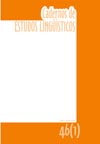Abstract
This study analyses the final negative marker in Brazilian Portuguese (BP), trying to find for such a phenomenon an adequate explanation within the theoretical background adopted - the Principle and Parameters Theory and its updated research on negation.References
BELLETI & Rizzi, L. (1981). “The syntax of ne”. In: The Linguistic Review 1, 117-154.
BELLETI & Rizzi, L. (1990). Generalized Verb Movement. Turin: Rosenberg and Tellier.
CALLOU, D. & LOPES, C.R.S. (orgs.) (1994). Linguagem falada culta na cidade do Rio de Janeiro: materiais para seu estudo. Rio De Janeiro. Faculdade de Letras/UFRJ. (Volumes: Vol. I - Ef; Vol. II – DID, Vol. III -D2).
CASTILHO, A.T. (1987). Linguagem Falada Culta Na Cidade de São Paulo: Diálogos Entre Dois Informantes. São Paulo: Queiroz / Fapesp.
CHOMSKY, N. (1995). A Minimalist Program. Cambridge, MIT Press.
CHOMSKY, N. (1994) . “Bare phrase structure”. In: MIT Occasional Papers in Linguistics 5, MIT Press.
CHOMSKY, N. (1993). “A Minimalist Program for Linguistic Theory”. In K. Hale and S. J. Keyser (eds.) The View from Building 20: Essays ins Inguistics in Honor of Sylvain Bromberges. 1/52, Cambridge, MA: MIT Press.
CHOMSKY, N. (1981). Lectures on Government and Binding. Dordrecht: Foris.
CHOMSKY, N. (1965). Aspects of the Theory of Syntax. Cambridge, Mass.: MIT Press.
FIGUEIREDO SILVA, M.C. (1996). A posição sujeito no português brasileiro. Editora da Unicamp. Campinas.
JERPERSEN, O. (1917). “Negation in English and other languages”. In: Selected writings of Otto Jerpersen. London, G. Allen & Unwin Ltd.
KAYNE, R. (1994). The Antisymmetry of Syntax. Cambridge: The MIT Press.
MARTINS, A. M. (1994). “ Aspectos da negação na história das línguas românicas”. In: Actas dos XII encontro nacional da associação portuguesa de lingüística. Editado por Ivo Castro.
MARTINS, E.E. (1997). Sentential Negation in Spoken Brazilian Portuguese. Dissertação de Mestrado. Georgetown University, USA.
MIOTO, C. (1991). Negação sentencial no português brasileiro e teoria da gramática. Tese de Doutorado. Unicamp, Campinas, SP, Brasil.
MIOTO, C. (1993). “Negação sentencial no PB”. In: Boletim da Abralin, 14, pp.105-112.
MIOTO, C. (1998) “Aspectos da sintaxe da negação”. In: Anais do XXVII GEL.
MIOTO, C. (1998b) “Tipos de negação”. In: Cadernos de Estudos Lingüísticos, 34, pp.103-117. Campinas, SP, Brasil.
NEGRÃO E. et alli, (1999). “Itens negativos em corpus do português brasileiro” (ms).
OUHALLA, J. (1991). Functional categories and parametric variation. Routledge. London. UK.
POLLOCK, J. (1989). “Verb Movement, Universal Grammar, and the Structure of IP”. In: Linguistic Inquiry, Volume 20, number 3. Summer, pp.365-424.
ROBERTS I. & ROUSSOU A. (1999). “A formal approach to gramaticalization”. In: Linguistics, Vol. 37-6 (364) p.1011.
SCHWEGLER, A . (1990). Analylicity and syntheticity: A diachronic perspective with special reference to Romance languages. Berlin, Mouton de Greyter.
TORRES MORAIS, M. A ( 2001) . “Aspectos da história da negação no português”. In Mattos & Silva, R. V. (org.). Para a história do Português Brasileiro. Novos Estudos. Vol. II. Tomo I. SP. Humanitas, pp. 149-203)
UkRIAGEREKA, J. (1999). “Multiple Spell-Out”. In: S. D. Epstein & N. Hornstein (eds). Working Minimalism. Cambridge, Mass: The MIT Press, 251-282.
ZANUTTINI, R. (1997). Negation and clausal Structure. A comparative Study of Romance Languages. Oxford University Press.
ZANUTTINI, R. (1994). “Re-examining Negative Clauses”. In: Paths towards Universal Grammar. Georgetown University.
The journal CADERNOS DE ESTUDOS LINGUÍSTICOS is granted all the copyright related to the published works. The originals will not be returned. By virtue of being part of this public access journal, the articles are free to use, with their own attributions, in educational and non-commercial applications

